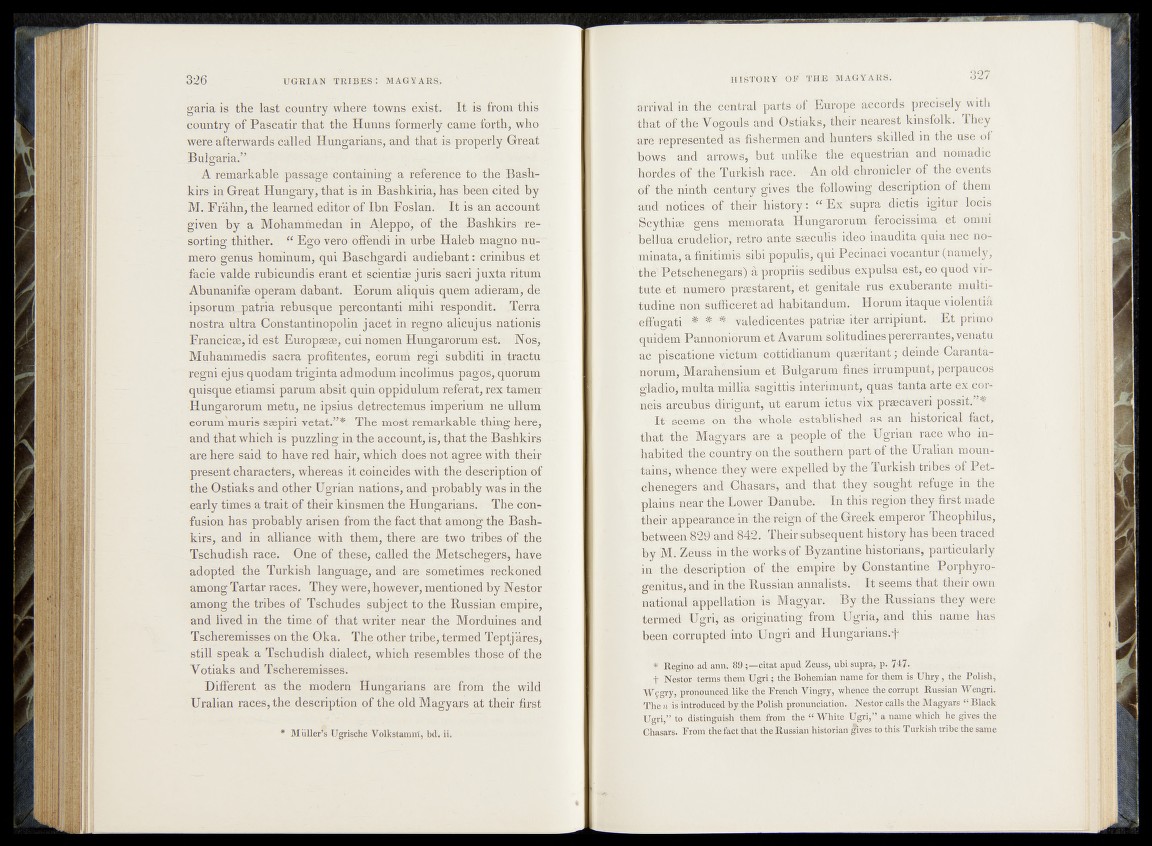
gariallA the last'country‘where, towns exist. It is from this
country of Pascatir that the Hunns formerly came, forth, who
were afterwards called Hungarians, and that is properly Great
Bulgaria.”
A remarkable passage containing a reference to the Bashkirs:
in Great Hungary, that is in B ashkiriaj has been cited by
M. JFrahn, the learned editor of Ibn Foslan. It is an account
given by a Mohammedan in Aleppo, of the Bashkirs resorting
th ith e r., “ Ego voro offend Wn urbe Haleb magno nu-'
mero geflus hominum, qui JBaschgardi audiebant :r,orinihus et
facie valde rubieundis erant et scientiæ juris feacri juxta ritiim
Abunanifæ operam dabant. Eorum aliquis quern adierami de
ipsorujoq~patria rebusque percontanti mihi reSpondit-. .Terra
nostra ultra ddnstamtinopolin jacet in regno alfcuibsihàfiohié
Erancicm, id est Europææ, cui nomen Hungaiwum^est^iBK^j
Muhammedis; sacra profitentes, eorum iregi subditi '.«n-^femtu.
regni ejus quodam triginta admodum-incolimus ipa^W,.quorum
.qùisque etiamsi parum absit quin oppidulum ireferat, rex tamerr
-Hungarorum metu, ne ipsius detréctemus imperiu^Ene ullum
eorum mûris sæpiri vetat.”*. The most remarkable-thing here,
and that which is puzzling in the account, is, that the Bashkirs
are here said to have red hair, which does-not^a^ree jyjth their
.present characters, whereas it coincides with the .description of
the Ostiaks and other. Ugrian nations," and probablywas-in the
early tunes ajtrait of their kinsmen the fiungarians§|ff The confusion
has probably arisen from the fact that among the« Bashkirs,
and in alliance with them, there are two fribessof the
Tschudish face. One of these, called the Metschegers, ha^e
adopted the Turkish language, and are sometimes reckoned
among Tartar races. They were jhowéver, mentioned by .N-estor
among the tribes of Tschudes subject to the Russian empire,
and lived in the time, of that writer near the Morduines and
Tscheremisses on fhe Oka. The other tribe, termed Teptjares,
still speak a Tschudish dialect, which resembles those Of the
Votiaka and Tscheremisses.
Different, as the modern Hungarians ; • AOL, gig are from the wild
TJralian races, the description of the old Magyars at their first
* M filler’s Ugrische Volkstamnl, bd, ii.
arrival in the central parts of» Europe accords precisely with
ilfat of theJVogouls and Ostiaks, their nearest kinsfolk. They
are represented as fishermen-and hunters skilled in the use of
bows and aridws,- but unlike' the equestrian and nomadic
hordes0 of 'the Turkish race. An old chronicler of the events
of the. ninth century gives®thd#fpllowing,- description of them
and! rfiotic es.vO'fe4 their hi story5: - “ Ex^^ipra dictis-tigit.ur locis
i^cythi^'l^ehS memorata Hungarorum ferocissima et omui
l^ llu a erudelior,* retro ante seeculis ideb’inaudita quia nec nor
minatkja fifiitimistsibi populis, qui Pecinaei Vopantur (namely,
' th b Petsdheiie'gSLi^) -a prdp'riis 'sedibus expulsa est, eo quod vir-
butedet diimefo praestarerM^eb gefiifalewus exuberante- multi-
tudin&jh'on suffice ret ad habitandum. Horum itaque violentia
effifg&4i * * jp waledi^htes- patriae iter arripiunt. E t primo
qufdbm3 Pannoniorum et Avarufri* shfitu dineS pererrantes, veil at u
^fe'ipiscatrOnb- vidtunr cottidianum q uasfitan t$isdeinde Caranta-
norum, M afkhln'sihm %^Bulgafe#m' fines- irr u nd puntj perpau cos
■^tedio, multa'millia" §^glttis ‘interim unt,- qttaS' tantaarte qx cor*
neis* afcubus diri^unt, ut earum ielMstyi-x praeeaveri possit. *
V'rt^ebmslsffin * the whole- established na's’-an historical fact,"
thshlMhie^ Magyars .are-a-pedple.of the Wjgri.an raee-who inhabited
t h h ^ h t f y on' the» southern part, of the Uralian mourn
tains»,1whe&lfeJhey were’ expelled b y the Turkish tribqflbf Pefc-
ehenegers- and Chdsa-rsi, and that they bought refuge in the
plainsfhear tWAiwei Danube.- " In thiferbgiomth'ey first'made
their appearance in the reighbfble Grqell emperor Theophilus,
between 829and 842. Their subsequent history has been traced
by -M.'Zeuss in theT tvorks'of Byzantine historians, particularly
in the description of the* empire' fey 'Gonstantine Porphyro-
genitus, alid in the Russian annalist. * It-seems that their own
national appellation is- Magy;ara By- th e T^ssians>they were
termed Ugri,! as originating|f#omv(Ugfia, and this1 name has
been corrupted into'TJngri and Hungarian®^’ -
* Regino ad aim. W j—citat apiic^ Zeuss, libi, sug,ra,;-p,.H 747..
,,f,^ e a ta r,t« p ia them Ugri; the Bohemian name for thepa is Uhry, the Polish,
Wfgry, pronounced French^Vingry, .whence tbe^orrupt Russian Wenpj.
Then ii introduced hy.the'Polish prpnunciation.^.Ntestpr calls the Magyars “ Black,
ii jg r i ,’'' to distinguish them from the “ White Ugri,” a name whjch he gives the
Chasars. From the fact that the Russian historian |ives to this Turkish tribe the same